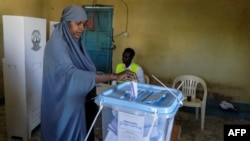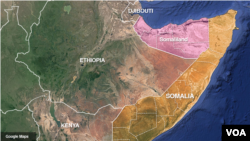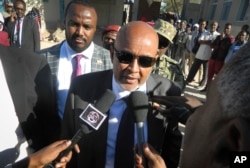At least two people were killed in post-election violence Thursday in the breakaway republic of Somaliland, after one of the two opposition parties claimed "massive" polling irregularities.
Hundreds of angry supporters of the Wadani Party took to the streets in three major cities, setting up roadblocks, burning tires, and stoning cars and businesses to protest the alleged election fraud.
One person was shot dead in violent riots in the capital, Hargeisa, and another in the town of Burao. In Erigavo, the largest city of the northeastern Sanaag region, protesters also clashed with police.
Somaliland's police chief, General Abdilahi Fadal Iman, warned politicians not to instigate violence.
"We call for everyone to stay calm and protect the peace, and I warn the people who are creating chaos and confusion within the public to avoid anything that can hurt the stability of Somaliland," Iman said.
Vote counting is still under way, with results expected within the next few days, according to the Somaliland National Electoral Commission (NEC).
Alleged irregularities
The protests erupted hours after Wadani's presidential candidate, Abdirahman Mohamed Abdullahi, questioned the transparency of the election.
Abdullahi was running against Muse Bihi of the ruling Kulmiye party and Faisal Ali Waraabe of the For Justice and Development party (UCID) to replace the outgoing president, who chose not to seek another term.
Wadani spokesman Osman Afgab said party members have withdrawn from the counting process.
"We have suspended participating in the counting process, data entry and the checking because the electoral commission ignored a complaint we have submitted to them over concerns of voting irregularities," he said.
Afgab said the party has seen evidence of fake ballot papers smuggled out of the polling stations in at least three Somaliland regions.
The allegations were denied by electoral commission chairman Abdikadir Iman Warsame, who said there was no ballot stuffing or other irregularities.
"There has never been forged ballot papers used during the election, and we assure the contesting candidates that we will listen to everyone's concern relating to the election process, and that our doors are open for them," Iman said.
On Monday, hundreds of thousands of voters cast ballots at more than 1,600 polling stations across Somaliland.
International observers
The head of a British-funded team of 60 international observers who monitored the vote said Thursday they saw some minor infringements of voting rules, but agreed the overall voting process met international standards.
"We determined that from our observations that there were not [irregularities] of sufficient scale to undermine the integrity of the electoral processes," said Michael Walls, a senior lecturer in the Development Planning Unit at University College London.
He said a social media ban and weak voter understanding of the intended polling procedures were among their issues of concern.
The central issue of the election, as always, is how to win international recognition for Somaliland. Somalia, which was once governed by Italy, wants Somaliland to be part of a single Somali state. But Somaliland, which used to be a British colony and broke away from the rest of Somalia in 1991, wants to be a separate country.
All three candidates favor a fully independent Somaliland, but have different visions of how to achieve it.
The new president will serve a five-year term with an option for a second term.






